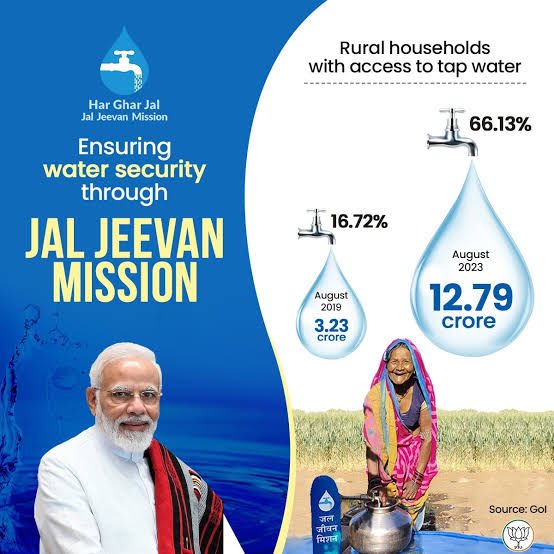The Government of India, in partnership with the states, is implementing the Jal Jeevan Mission (JJM) – Har Ghar Jal to provide potable tap water to every rural household in the country.
According to the latest data, as of August 5, 2024, more than 15.04 crore (77.87%) out of 19.32 crore rural households in the country now have tap water supply in their homes. This is a significant achievement, as at the start of the Jal Jeevan Mission in August 2019, only 3.23 crore (16.8%) rural households had tap water connections.
The Jal Jeevan Mission aims to provide a functional tap water connection, delivering water at a service level of 55 litre per capita per day (lpcd) of prescribed quality (BIS:10500), on a regular and long-term basis.
The positive impacts of the life-changing Jal Jeevan Mission are being assessed by reputed national and international institutions and individuals. The World Health Organization (WHO) estimates that achieving saturation under JJM will result in savings of more than 5.5 crore hours of time every day, primarily for women, who would no longer have to collect water for household needs.
The WHO also estimates that ensuring safely managed drinking water for all households could prevent nearly 400,000 deaths caused by diarrheal diseases, leading to savings of approximately 14 million Disability Adjusted Life Years (DALYs).
Furthermore, Nobel laureate Prof. Michael Kremer has concluded that the coverage of all households with safe water is likely to lead to almost a 30% reduction in mortality among children below the age of five years, amounting to 1,36,000 lives saved annually.
The implementation of the Jal Jeevan Mission is also expected to generate significant employment opportunities. The Indian Institute of Management Bangalore, in partnership with the International Labour Organisation (ILO), has estimated that the Mission shall result in 59.9 lakh person-years of direct and 2.2 crore person-years of indirect employment during the capital expenditure phase.
Additionally, the operation and maintenance of the Mission is likely to generate 13.3 lakh person-years of direct employment.
To ensure the long-term sustainability of the infrastructure created, several measures have been put in place, including third-party inspection, sensor-based IoT solutions for water supply monitoring, and the involvement of the rural community in planning, implementation, management, operation, and maintenance of the in-village water supply systems.
Union Minister of State for Jal Shakti, V. Somanna, informed the Lok Sabha that while significant progress has been made, states and UTs have also faced challenges, such as the lack of dependable drinking water sources in water-stressed and drought-prone areas, the presence of geo-genic contaminants in groundwater, uneven geographical terrain, and delays in the release of matching state shares.
To address these challenges, the government has taken several steps, including the implementation of Special Assistance to States for Capital Expenditure, the nomination of nodal officers to facilitate statutory and other clearances, and the establishment of State and District Programme Management Units.
Additionally, the Jal Shakti Abhiyan: Catch the Rain campaign has been launched to encourage water conservation at the grassroots level.
















